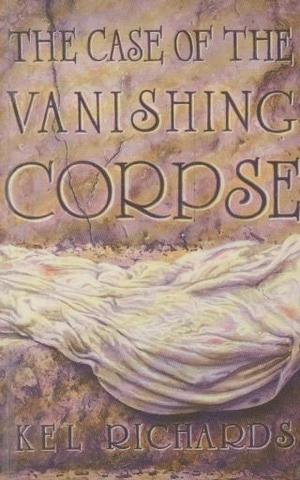 Not sure how I ended up with this book, but it’s a detective story that takes the account of Jesus’ death sets it in modern time. Ben Bartholemew is a private eye from Jerusalem who must solve a mystery: the corpse of political agitator Jesus Davidson has disappeared following his execution by the occupying Romans. Rumors persist that Jesus came back to life.
Not sure how I ended up with this book, but it’s a detective story that takes the account of Jesus’ death sets it in modern time. Ben Bartholemew is a private eye from Jerusalem who must solve a mystery: the corpse of political agitator Jesus Davidson has disappeared following his execution by the occupying Romans. Rumors persist that Jesus came back to life.
The reason I’ve always remembered it is because it has ridiculous dialogue.
“This job is of the utmost urgency, but it must be handled with the greatest discretion.”
“Oh…sure. Sure. Discretion – that’s my middle name.”
“Your best brandy, and make it a double,” I said as I hoisted myself onto a bar stool.
“This is the real stuff,” said Nick. “Genuine Egyptian. And what’s wrong with you? You look like you’ve seen a ghost.”
“It’s not a ghost I’ve seen, Nick, it’s a ghost I’m looking for.”
“Uh? That don’t make no sense.”
“This afternoon, Nick, ol’ buddy, nothing makes any sense.”
I hailed a passing cab and told him to take me to the Fish Gate.
“Hey, buddy,” said the cab driver, “you know why they call it the Fish Gate?”
“Why?”
“Because it stinks.”
“You just drive. I’ll make the jokes.”
Sometimes the author goes on a roll and gives us paragraphs like this:
I sat down. As I did so the man behind my desk flashed a badge at me. I recognised it at once: RIA-The Roman Intelligence Agency. There are some people who say the express “Roman Intelligence” is an oxymoron (look it up in your Funk & Wagnalls). On the other hand, you have to admit that the Romans are an inventive people. Just look at all the things they’ve invented: roads, Fiats, dry cleaning fluid. Mind you, the only reason they invented dry cleaning fluid was because they’d invented spaghetti first, and they had to get the Bolognese off their togas.
You might think this is some kind of crazy irreverent satire. But the book continually attempts scenes of pathos. It seems unsure of what tone to take.
J-dawg himself doesn’t appear in the book, but other Biblical figures do. In his quest to find the body of Jesus, Ben interviews Pontius Pilate, King Herod, Joseph of Arimathea, Marcus Longhinus (“Marcus” is a made-up name, but then, “Longhinus” probably is too…he doesn’t get a name at all in the Bible!) and numerous others. These scenes could have been fascinating. Instead, the author mostly fills them with stupid clowning around. Herod’s personal security detail is called the KBG (King’s Body Guard), with Herod himself being comically sexually ambiguous. Doubting Thomas appears here, with his personality so Flanderised that he just responds with “I doubt it” to everything anyone says, like a broken record.
I really liked how the author handled Barabbas, the thief who was freed instead of Jesus. He is presented as a troubled man who is beginning to realise who Jesus was, and that his rescue from death was the most rigged-scales bargain in history. Barabbas’s scenes are the only emotionally effective parts of the book, islands of pathos in an ocean of stupid jokes, Dick Tracy one-liners, and Biblical Who’s Who.
Nora Lofts’ How Far to Bethlehem is one of the best fiction books about Jesus that I’ve read. This is one of the worst. We all know how the Gospels end, we all know what Ben’s investigation will soon discover, it’s the most famous story in the world. All The Case of the Vanishing Corpse does is muddle around until it arrives at an inevitable conclusion.
No Comments »
 Metallica’s final “real” work is complex and confusing, not an album full of headbanging but of musical ideas. It’s hard to get into at first but it is absolutely one of their best efforts.
Metallica’s final “real” work is complex and confusing, not an album full of headbanging but of musical ideas. It’s hard to get into at first but it is absolutely one of their best efforts.
The album’s production is its biggest barrier. I’m not talking about the absent bass. You could delete the bass off 90% of metal albums ever made and nobody would know. I’m talking about the thin and trebly guitar tone, the clicky drums, and the dry nature of the overall sound. Where contemporaries are all “BEER! THRASH!!!” this is the equivalent of a heavy metal dissertation, presenting ideas to you via footnoted and cited Word documents.
The song everyone knows, “One” is maybe the worst track on here. The musical ideas are all there, but the production guts it. This sort of thing needs to sound massive and heart-wrenching, not as sterile as my pet cat. The album’s best moments are “Blackened,” title track, “Harvester of Sorrow”, “Dyers Eve” and the hugely underrated “Frayed Ends of Sanity”
The main creative wellspring the band was drawing from here seems to be progressive thrash legends Watchtower (Lars, it seems, was a fan of the band), and most of the songs are lengthy and benefit from repeated listens. The title track is very complex, the riffs keep on coming and coming, as if they’re being written by a man with six imaginations instead of the usual one. Justice sees Metallica ditching the last remnants of their motorbikes and leather aesthetic in favor of lots of social commentary. This is an album overflowing with things to say. “Eye of the Beholder” and “Shortest Straw” match socially conscious lyrics with riffwork more calculated and focused than ever before. Early Metallica was the brutal bludgeoning and thrashings of a crime of passion. These songs are completely pre-meditated.
“Frayed Ends” is an amazing achievement, throwing idea after idea at you, and look, the song doesn’t get lost! The final riffset is awesome, and it seems they only ended the track there to make room for the other songs. “Dyers Eve” abandons the longwindness that dominates most of the album and just spends five minutes ripping your arms off, beating you around the head with them, reattaching them to your lower esophagus, and sticking you with the surgeon’s bill (it has some very frank and personal lyrics from Hetfield about his childhood, too).
The album is not as good as Master of Puppets. I can’t say I am completely enthralled by “To Live is to Die”, but neither was I bored. Judging an epitaph by its entertainment value seems unpleasant, anyway. I mostly just appreciate how Metallica didn’t let Cliff Burton’s death become a footnote in the liner notes: they actually wrote him a song.
Justice is a paradox: a genre album that somehow doesn’t seem to belong to the genre. This is a metal album for nerds. Instead of raw aggression, Justice presents aggression filtered through a few levels of peer review.
No Comments »
 Well, it’s all here, the modern age’s most famous rags to riches story…except Arnold didn’t even start out with rags, he started out with a large, muscular body.
Well, it’s all here, the modern age’s most famous rags to riches story…except Arnold didn’t even start out with rags, he started out with a large, muscular body.
Over 600 pages Arnold relates his life story, from being a child growing up in postwar Austria to being one of the world’s biggest political magnates. Arnold fans will already know 95% of what’s here, but now they get to experience it with a little more filigree around the edges. There’s a lot of detail in here, and lot of stuff that’s interesting to know even though it’s too boring for the tabloids.
We learn more about Arnold’s role and duties in the Austrian army. There’s a funny story about him knocking down a wall with a tank. We hear the story of how he went AWOL – he sneaked out to compete at a bodybuilding show, won, returned with his trophy, and got thrown in jail – told yet again, as well his exposure to the reality of life as a poor bodybuilder (tip: gay for pay is an option you keep on the table.) Most of that was in his first book, Education of a Bodybuilder, but now it’s infused with extra detail and the honesty of long hindsight.
I don’t care much about politics or movies, so I didn’t pay as much attention to those parts of the books. What struck me mostly was the largeness of his ambition. Bodybuilding was and is a small scene, and soon he simply outgrew it. Another man in Arnold’s place might have just stayed right in that little pond, racking up trophy after trophy. But after a point you have to stop wondering whether you measure up to a goal, and start wondering whether the goal measures up to you…
We learn about his start in acting, from crappy movies to noncrappy movies to masterpieces like the first Terminator. Lots of behind-the-scenes stuff with everyone from Wilt Chamberlain to Dino De Laurentiis. He explains a lot about his reasoning and thought process, and why he sometimes participated in movies that he knew were bad (Red Sonja, Conan II.) Eventually, a woman called Maria enters the picture, and we learn so much about their wedding that we soon feel like uninvited guests at the reception.
The writing is decent, neither good nor bad. Frankly, the content of the book is so strong that it is simply impossible for Total Recall to fail. They could have drafted the night janitor at Gold’s Gym to ghostwrite Total Recall and it would still have been a good book. If you want anecdotes, you’ve got them. Each page contains enough anecdotes to power 3.5 cocktail parties, 4 if you factor in bathroom breaks.
As a tell-all book, yes, it does go into THAT. There’s not much about Arnold’s affair here that hasn’t been reported by the press. He just admits to everything and says that he’s sorry. One of the more boring parts of Total Recall…and probably by intention.
If you’re expecting to hear this book in your head in Arnold’s voice, you won’t. My only complaint is that there’s not much personality in the writing and storytelling of the book. Everything’s quite bland and political and chummy. There’s not a lot of the “personality” that you’d expect an autobiographical book to have. But maybe we can’t expect anything else from Arnold. He’s a human chameleon, capable of assuming any guise or role required of him. Now, he’s a biographer. An autobiographer in the technical sense, I suppose. But here it almost seems incidental that the story he’s telling is his own.
No Comments »
 Not sure how I ended up with this book, but it’s a detective story that takes the account of Jesus’ death sets it in modern time. Ben Bartholemew is a private eye from Jerusalem who must solve a mystery: the corpse of political agitator Jesus Davidson has disappeared following his execution by the occupying Romans. Rumors persist that Jesus came back to life.
Not sure how I ended up with this book, but it’s a detective story that takes the account of Jesus’ death sets it in modern time. Ben Bartholemew is a private eye from Jerusalem who must solve a mystery: the corpse of political agitator Jesus Davidson has disappeared following his execution by the occupying Romans. Rumors persist that Jesus came back to life.

